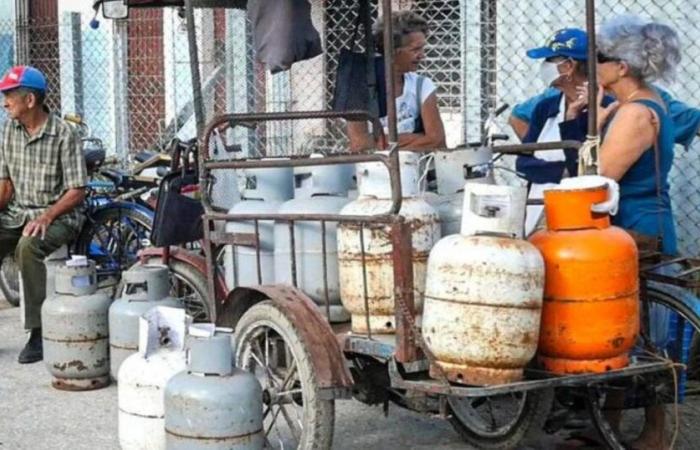Almost 50 days have been Sancti Spíritus residents without access to liquefied gas, an essential fuel for food cooking in a context also marked by constant electrical blackouts.
The situation affects hundreds of families that depend on this basic service to meet their minimum needs.
Speaking to the press, José Alberto Martínez, director of the Commercial House of Liquefied Gas in that province, publicly admitted that there is no inventory available throughout the country, and what is currently produced in the Cienfuegos Refinery is destined exclusively to the health and education sectors, reported the officialist newspaper Escambray.
“Today we continue without availability in liquefied gas inventory in the country,” said the official.
“We have no prognosis; as between gas to the country and free us, we will be selling in the province,” Martínez said, leaving few hopes of a solution close to a problem that has forced many spirit families to resort to alternative cooking methodssuch as firewood or coal, in the 21st century.
Asked about the estimated date for the restoration of the supply, the official was blunt: “We don’t know”.
Despite rumors that circulate on the street on a possible absence of gas until 2026the manager denied such a scenario, although without offering a guarantee of when the situation will be resolved.
“We don’t think it takes a year or six months without selling gas,” he said.
The official also denied versions that ensure that liquefied gas could be marketed only in dollars when it is available again. “That is false”, He replied before the direct consultation of the local press.
-Despite the lack of concrete information and a clear distribution schedule, the authorities have not offered viable alternatives for affected families, which face the cooking dilemma without stable electricity or domestic gas, in the midst of a national energy crisis that is deepened.
This extreme scarcity panorama has caused the increase in corruption linked to the commercialization of liquefied gas.
Recently, the Cuban regime revealed a Corruption plot in the Liquefied Gas company in Havanawhich involves managers of the Petroleum Cuba Union (CUPET).
According to an official profile, an investigation has revealed that the operations were led by Niuvis Suárez Mola and Iván Agustín Lora Alfredo, worker and director, respectively, of the Liquefied Gas Company of Havana.
Frequent questions about the shortage of liquefied gas in Cuba
What is the main reason for the shortage of liquefied gas in Cuba?
Liquefied gas scarcity in Cuba is mainly due to financial problems that have affected payments to international suppliers, which has resulted in partial fuel discharges. This situation has generated a supply crisis that directly impacts the daily life of the population.
How does the lack of liquefied gas affect Cuban families?
The lack of liquefied gas seriously affects the ability of families to cooksince many depend exclusively on this resource. Given the shortage, they have had to resort to alternatives such as firewood or coal, which represents a setback in living conditions and raises risks to health and the environment.
What has the Cuban government done to solve the liquefied gas crisis?
The Cuban government has managed the arrival of tanks ships To try to resume the distribution of liquefied gas, starting with partial downloads in Santiago de Cuba. However, limited distribution capacity and high demand have prevented an effective and rapid solution to the problem.
What are the alternatives that Cubans have adopted in the absence of liquefied gas?
Many Cubans have turned to cook with firewood or coal as alternatives to the lack of liquefied gas. This situation has resurfaced in a context of fuel shortage, remembering practices of past times and generating new difficulties for families.
What do citizens think about government management before the gas crisis?
Citizens express discontent and frustration with government management in the face of liquefied gas. Long lines and lack of concrete information have generated a climate of uncertainty and distrust, exacerbating popular discontent and the perception of an ineffective management of the problem.






